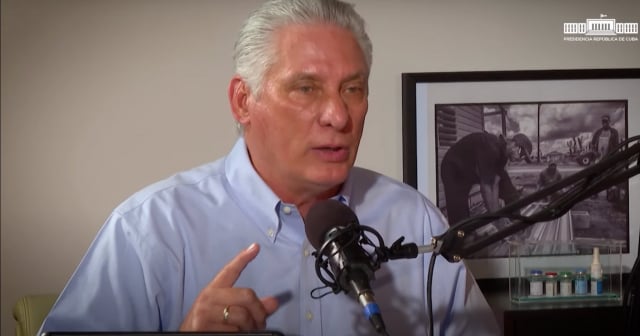In the midst of a context marked by a severe economic, social, and political crisis in Cuba, leader Miguel Díaz-Canel has reiterated his call to the population to confront the challenges through what he refers to as "creative resistance" as a solution to the country's problems.
During a recent episode of his podcast Desde la Presidencia, the president expressed optimism about the ability of neighborhoods and municipalities to solve problems that, according to him, "are not related to the blockade."
"I am convinced, and my visits to the provinces reaffirm this, that only through unity and in those smaller structures, more connected to daily life, such as neighborhoods and municipalities, can we effectively address and resolve many issues that are unrelated to the blockade and its impacts on the challenging daily lives of Cuban families," stated Díaz-Canel.
The "unity" mentioned by the leader contrasts with the spontaneous protests that have emerged as a reflection of popular discontent.
The shortage of food, medicine, and fuel, along with the deterioration of the electrical system, has plunged the country into chaos, which the official narrative tries to cover up by solely blaming the U.S. embargo.
However, many Cubans believe that the discourse of the blockade has ceased to be a valid excuse for justifying the government's stagnation.
In his remarks, Díaz-Canel acknowledged that the situation is "difficult," but he did so from a perspective that downplays the internal responsibilities of the regime he leads: "There is no way to soften what our nation is suffering for daring to defend its independence, its sovereignty, and the certainty that a fairer world is possible," he stated.
“It has been as hard as it has been for no other people for so long, over 60 years creating a web of obstacles, harassment, persecution, and laws. That is the blockade that the government of the United States has imposed on us through various administrations,” he continued justifying.
Despite the obvious structural deficiencies and the lack of deep economic reforms, the leader insisted that they will not "sit idly by" waiting for a change in policy.
Díaz-Canel's approach, focused on promoting "creativity" to alleviate the effects of the crisis, has been described by many as empty and ineffective in light of the seriousness of the situation.
Meanwhile, the government continues to refrain from implementing structural reforms that address the roots of a crisis that is not only a consequence of the embargo but also of stagnation and poor internal management.
For critics, "creative resistance" is nothing more than another failed attempt to sell hope to a population exhausted by decades of broken promises and repression.
Since the beginning of his term, Miguel Díaz-Canel has turned to the concept of "creative resistance" as a response to the deep crisis facing Cuba.
In December 2022, during the inauguration of the IV International Convention Cuba Salud, he urged Cubans to "resist with creativity" in the face of adversity, suggesting that this strategy would help combat the U.S. "blockade."
Months later, in May 2023, during the closing of the VI Plenary of the Communist Party of Cuba, he reiterated the need to "resist and create at the same time," emphasizing the importance of finding innovative solutions within the socialist model.
However, his words contrast with the ostentatious luxuries displayed by those close to power.
Recently, the engagement of actress Ana de Armas to Manuel Anido Cuesta, stepson of Díaz-Canel, was confirmed, which has generated outrage among Cubans who view this relationship as a reflection of the ruling elite's disconnection from the country's reality.
Likewise, Sandro Castro, the grandson of dictator Fidel Castro, has faced criticism for flaunting luxuries on social media, including the extravagant birthday party he has been announcing in Havana for several days, contrasting sharply with the austerity promoted by the government and the dire situation that Cubans are experiencing.
Filed under:
